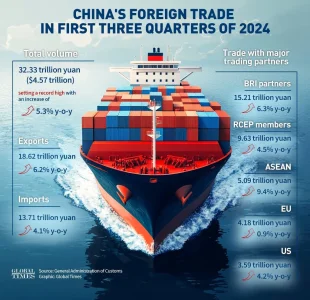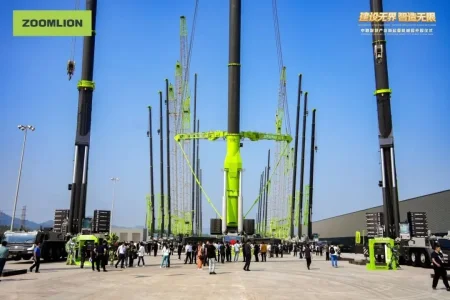China continues to impose anti-dumping duties on U.S., Japanese hydriodic acid
(
Xinhua) 14:16, October 15, 2024
BEIJING, Oct. 15 (Xinhua) -- China's Ministry of Commerce (MOC) on Tuesday announced its decision to continue to impose anti-dumping duties on hydriodic acid originating in the United States and Japan.
China introduced the duties on Oct. 16, 2018 for a period of five years as such imports had caused substantial damage to its domestic industry. Following the end of the term last year, the MOC launched investigations to review the anti-dumping at the request of the domestic industry.
The MOC said in a ruling that if the duties are terminated, the dumping practice and related damage will likely continue or reoccur.
The duties will be levied for another five years starting Wednesday, with a tax rate of 123.4 percent for U.S. companies and 41.1 percent for Japanese companies.
BEIJING (Reuters) -China's export growth slowed sharply in September while imports also unexpectedly decelerated, undershooting forecasts by big margins and suggesting manufacturers are slashing prices to move inventory ahead of tariffs from several trade partners.
Export momentum had been one bright spot for the Chinese economy that has struggled to gain traction
due to weak domestic demand and a property market debt crisis, adding to the urgency for stronger stimulus.
Outbound shipments from the world's second-largest economy grew 2.4% year-on-year last month, the slowest pace since April, customs data showed on Monday, missing a forecast 6.0% increase in a Reuters poll of economists and a 8.7% rise in August.
Imports edged up 0.3%, missing expectations for a 0.9% rise and softer than 0.5% growth previously. The weak data does not bode well for exports in coming months as just under a third of China's purchases are parts for re-export, particularly in the electronics sector.
"Export growth slowed last month but remained resilient, with volumes still rising at a double-digit pace," Zichun Huang, China economist at Capital Economics said. "Further ahead, though, growing trade barriers are likely to become an increasing constraint."
"The pivot toward monetary easing should also help support demand among China's trade partners. But China's export success is prompting increasing trade restrictions from other countries, which threatens to dampen longer-term export growth," she added.
The European Commission on Oct. 4 saw its motion to impose additional duties on electric vehicles built in China of up to 45% pass in a divided vote of EU member states, joining the U.S. and Canada in tightening trade measures against China.
China's overall trade surplus narrowed to $81.71 billion in September from $91.02 billion in August and missed a forecast of $89.80 billion.
Manufacturing activity shrank sharply in September, according to a recent factory owners' confidence survey, with new export orders falling to their worst in seven months.
Analysts have attributed previous months' strong export performance to factory owners slashing prices to find buyers.
"Export growth in the fourth quarter is still likely to remain positive, but in the context of slowing external demand, the downside risk of exports is large," said Wang Qing, chief macro analyst at Oriental Jincheng, adding that manufacturing activity was way below the average for the last 10 years.
DOUR DOMESTIC DEMAND
Last week, the head of China's state planner said he was "fully confident" of achieving the government's full-year growth target of around 5%.
And on Saturday, Chinese officials announced plans to ramp up debt issuance to aid local governments in managing their debt problems and provide increased support to low-income earners.
But the omission of a dollar figure for the package prolongs investors' nervous wait for a clearer policy roadmap to overcome deflationary pressures and lift consumer confidence.
Officials waited until after China's markets had closed to release the trade data. The U.S.-listed shares of red parka maker Canada Goose dropped 4.4% before the bell after Wells Fargo downgraded its stock on weak China demand.
Analysts anticipate it will take a long time to restore consumer and business confidence and get the $19 trillion economy on a more solid footing. A housing market recovery, in particular, could be a long way off.
That said, China's iron ore imports rose 2.9% last month year-on-year, partly on hopes for improved demand over September and October, the peak construction season, while the country's copper imports climbed from a month prior too.
New bank lending in China missed forecasts in September, separate data released by the People's Bank of China showed, although household loans, including mortgages, rose to 500 billion yuan in September from 190 billion yuan in August, according to Reuters' calculations.
"The change of fiscal policy stance as indicated by the press conference over the weekend is critical as a pillar for growth next year," said Zhiwei Zhang, chief economist at Pinpoint Asset Management.
"Looking ahead it would be difficult to sustain strong export growth into next year, as trade tension heightens."
(Additional reporting by Ethan Wang; Editing by Jacqueline Wong and Christina Fincher)
BEIJING (Reuters) -China's export growth slowed sharply in September while imports also unexpectedly decelerated, undershooting forecasts by big margins and suggesting manufacturers are slashing prices to move inventory ahead of tariffs from several trade partners. Export momentum had been one...

www.yahoo.com









